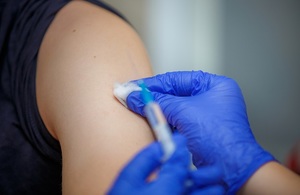
Credit UK PHE/CMO
#16,121
Although it has only recently begun to make headlines, as early as last Spring (see UK To Begin New Clinical Trial On COVID `Booster' Vaccines), we were looking at the `red flags' that were suggesting a 3rd `Booster shot' might be needed before the end of 2021.Since then we've seen mounting evidence that over time - and when challenged by new variants - the protection afforded by our current COVID vaccines appears to wane significantly after about six months.
A few recent blogs include:
UK Preprint: PITCH study – Antibody & Cellular Immune Responses after Two Different Dosing Schedules of the Pfizer Vaccine
With 80% of the world yet to have access to their 1st dose of the vaccine, there are both logistical and ethical arguments against richer countries dispensing a 3rd dose. Just over a week ago by the World Health Organization's Director Dr. Tedros Adhanom Ghebreyesus who called for a moratorium on booster shots until at least September, to allow at least 10% of the population in all countries to be vaccinated.
Just last week the NEJM carried an article warning of the potential risk of new variants emerging from long-term infections among immunocompromised individuals (see SARS-CoV-2 Variants in Patients with Immunosuppression), a concern we've seen raised previously (see here, and here).
While it is increasingly likely that most people who received a COVID vaccine more than 6 months ago will need a COVID booster at some point, overnight the FDA authorized a 3rd booster shot for the most immediately vulnerable cohort; the immunocompromised.
The FDA also recommends that: . . . immunocompromised individuals discuss monoclonal antibody treatment options with their health care provider should they contract or be exposed to COVID-19.
For now, this authorization only applies to a very narrow population; those who are `. . . solid organ transplant recipients or those who are diagnosed with conditions that are considered to have an equivalent level of immunocompromise.'
The FDA's announcement follows:
FDA NEWS RELEASE
Coronavirus (COVID-19) Update: FDA Authorizes Additional Vaccine Dose for Certain Immunocompromised IndividualsOther fully vaccinated individuals do not need an additional vaccine dose right nowFor Immediate Release:August 12, 2021Today, the U.S. Food and Drug Administration amended the emergency use authorizations (EUAs) for both the Pfizer-BioNTech COVID-19 Vaccine and the Moderna COVID-19 Vaccine to allow for the use of an additional dose in certain immunocompromised individuals, specifically, solid organ transplant recipients or those who are diagnosed with conditions that are considered to have an equivalent level of immunocompromise. The Centers for Disease Control and Prevention’s Advisory Committee on Immunization Practices is scheduled to meet Friday to discuss further clinical recommendations regarding immunocompromised individuals. Today’s action does not apply to people who are not immunocompromised.“The country has entered yet another wave of the COVID-19 pandemic, and the FDA is especially cognizant that immunocompromised people are particularly at risk for severe disease. After a thorough review of the available data, the FDA determined that this small, vulnerable group may benefit from a third dose of the Pfizer-BioNTech or Moderna Vaccines,” said Acting FDA Commissioner Janet Woodcock, M.D. “Today’s action allows doctors to boost immunity in certain immunocompromised individuals who need extra protection from COVID-19. As we’ve previously stated, other individuals who are fully vaccinated are adequately protected and do not need an additional dose of COVID-19 vaccine at this time. The FDA is actively engaged in a science-based, rigorous process with our federal partners to consider whether an additional dose may be needed in the future.”People who are immunocompromised in a manner similar to those who have undergone solid organ transplantation have a reduced ability to fight infections and other diseases, and they are especially vulnerable to infections, including COVID-19. The FDA evaluated information on the use of a third dose of the Pfizer-BioNTech or Moderna Vaccines in these individuals and determined that the administration of third vaccine doses may increase protection in this population. These patients should be counseled to maintain physical precautions to help prevent COVID-19. In addition, close contacts of immunocompromised persons should get vaccinated, as appropriate for their health status, to provide increased protection to their loved ones.It is recommended that immunocompromised individuals discuss monoclonal antibody treatment options with their health care provider should they contract or be exposed to COVID-19. The FDA has authorized monoclonal antibody treatments for emergency use during this public health emergency for adults and pediatric patients (ages 12 and older weighing at least 40 kilograms or about 88 pounds) with positive results of direct SARS-CoV-2 viral testing, and who are at high risk for progressing to severe COVID-19 and/or hospitalization. One authorized product includes use for preventative (prophylaxis) treatment after being exposed to SARS-CoV-2; however, this product is not a substitute for vaccination.The Pfizer-BioNTech COVID-19 Vaccine is currently authorized for emergency use in individuals ages 12 and older, and the Moderna COVID-19 Vaccine is authorized for emergency use in individuals ages 18 and older. Both vaccines are administered as a series of two shots: the Pfizer-BioNTech COVID-19 Vaccine is administered three weeks apart, and the Moderna COVID-19 Vaccine is administered one month apart. The authorizations for these vaccines have been amended to allow for an additional, or third, dose to be administered at least 28 days following the two-dose regimen of the same vaccine to individuals 18 years of age or older (ages 12 or older for Pfizer-BioNTech) who have undergone solid organ transplantation, or who are diagnosed with conditions that are considered to have an equivalent level of immunocompromise.The EUA amendments for the Pfizer-BioNTech COVID-19 Vaccine and the Moderna COVID-19 Vaccine were issued to Pfizer Inc. and ModernaTX Inc., respectively.Related Information
